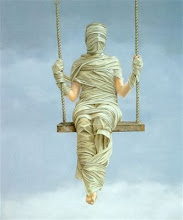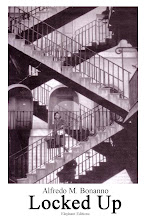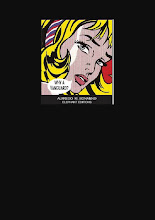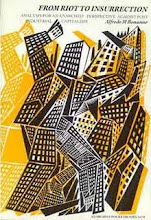Since the beginning of time man has had a taste for risk and adventure and distorted forms of play such as duels and hunting. Games that put the player’s life on the line also date back to ancient times. But to avoid going too far back in history, it is enough to think of Russian roulette, which everyone remembers from the pages of a great Russian novel, or from scenes in a fairly recent American film. In the Fifties a film about violence in rural America depicted a game called the ‘rabbit jump’, a race between youths, each at the wheel of a car heading towards a cliff edge. The one who jumped out last was the winner. In recent months there have been reports in the news of a ‘motorway roulette’, which consists of driving along a stretch of motorway the wrong way: whoever gets furthest wins. Another game in fashion with Israeli boys, some under ten, consists of placing a schoolbag in the middle of the road and snatching it back when a car approaches. The one who retrieves his last wins. According to news reports a number of children have died playing this game.
So why put one’s life on the line?
The answer might simply be that it is due to the ‘crisis in values’of an advanced post-industrial society which has no future to offer young people. Another recent American film showing gang warfare in Los Angeles ended up with a youth who, rather than let himself be arrested, shot a policeman shouting ‘There’s no future!’ And that might be a good answer. The everyday experiences that form the personality have been seriously affected by the profound changes that have taken place in the social and economic structures of advanced industrialised countries over recent years. The thoughts, emotions and actions of individuals are immersed in a situation that has no pre-existing categories to put them in any kind of order and give them any sense of security.
This is leading the younger strata, those not able to cope with such a situation or who are not yet in possession of well-rooted interests and ideas, to feel ‘value-deprived’ and unable to ‘give any meaning to life’.
Why is this too simple an answer? First, because it does not seem right to me to relegate everything to an underlying social mechanism that explains everything. Behind this mental attitude lurks a kind of neo-determinism that prevents us from grasping the real motivations at the root of things which, if brought out into the open, might give us a better indication of what to do.
The social disintegration resulting from economic restructuring in the Eighties is certainly one of the reasons for the chipping away at the values that emerged in the postwar period and remained more or less intact until the end of the Seventies. An institution such as the family, which is turning out to be less and less solid or capable of resolving the important task assigned to it by the bourgeois capitalist society of the last century, is being hit not only by the changing conditions of the world of work and production, but also by the circulation of different ideas, culture, concepts of time and space, and so on. Each of these elements, which it would be simplistic to group together under the term economy, has produced conditions that need to be examined individually. They are of great importance and make up the connective tissue onto which emotions are grafted the thoughts and actions of so many of the young people who come face to face in today’s football stadia and play with their lives in a thousand ways, finding themselves as they do with no future, certainties or hope.
Here we are not simply looking at the marginal phenomenon of the late integration of young people into the conditions imposed by social life. This has always existed. What we can see now is a phenomenon of a consistency and extension unknown in the past. And if we want to understand it we must also look at our own thinking patterns. We once thought, and rightly so, that working conditions were central to comprehending the reasons as to why the proletariat engaged in the class struggle, including the revolutionary perspective. But objective conditions are changing. We used to think that the struggles of the working class could at any moment transform themselves into revolutionary consciousness, precisely due to the defects in the system of production as a whole. We can no longer think in such an automatic way.
We used to say that one thing that put a brake on the class struggle was the educational integration of young people through the family, the foundation stone of the uniformity of judgement that was completed at school, in the army and at work. Many of these things have now changed. Various concepts have entered the family since its disintegration set in, leading it to breathe an air of paternalism, when not downright puerocracy. Information reaches households directly through television, so the censuring filtre of parents no longer functions. The latter have also lost some of the authority that once came from simple physical strength, as there are stricter controls by the State concerning violence towards the underaged. The old affection, the stuff of seventeenth century oil paintings upon which the family was supposed to be based—for the most part a fantasy of writers and poets—is no longer able to cover up the real lack of feeling that exists within this institution. And we anarchists were among the first to put forward a serious critique of the family as the origin of many of the horrors of the class society.
The same goes for school, where, with far-sighted clarity, we saw its limitations and defects in the nineteenth century, proposing a libertarian form of education that has now been taken over by the intellectuals of the regime. I don’t known if we are capable of understanding what is really happening in school today, but it does not seem to me to be a sector in which we are any further behind than others. The level of anarchist analysis today does not seem to be up to comprehending the rapid changes that are taking place in society and the economy. This is demonstrated by what is being said about the problem of production, and, with a constancy worthy of greater things, the insistence on the validity of more or less revolutionary syndicalism.
In our opinion, new problems are presenting themselves on the social scene that cannot be faced by using old analyses, even though they might have been correct at one time. In a way, we have not been able to take what we ourselves formulated to its logical conclusion. The example of the family is significant. We were among the first to denounce the repressive functions of this institution but are nowhere near first, today, in drawing the relevant conclusions.
The general loss of traditional values does not see us capable of proposing, I would not say substitutes for, but even critiques of other people’s proposals. In the face of the many young people who are asking for a good reason not to put their lives on the line, we do not know what to say. Others have given what we know are not real answers, but the young take them to be such, extinguishing their liberatory aggressiveness and reducing themselves to passive instruments in the hands of power. Others tell them life has a value in itself, because God gave it to us, because it serves pleasure, the Revolution, the continuation of the species, and so on. We know that, taken individually, these statements are not right, but we do not know what to propose as a valid alternative to the game of risk for its own sake.
[Original title: Come giocarsi la vita e perché, "ProvocAzione" n. 21, June 1990. English translation by Jean Weir in collaboration with John Moore and Leigh Starcross, published in Dissonances, Elephant Editions, London]
skip to main |
skip to sidebar

Some writings of Alfredo Maria Bonanno in English, or almost

Alfredo Bonanno was arrested on October 1st 2009 in Greece, accused of concourse in robbery. With him, anarchist comrade Christos Stratigopoulos.
Here are a few translations and part translations of a small portion of Alfredo's writing. This is a work in progress, many of the translations are as yet incomplete. Open links to find more of Alfredo's work.
Alfredo Bonnano Released
Nov. 22 Alfredo Bonnano was sentenced to 4 years imprisonment (which practically means that with the time served so far and the fact that he is over 70years old HE IS RELEASED
Christos Stratigopoulos (who took responsibility for the action)
was sentenced to 8 years and 9 months with the Greek law will probably be released at the end 2011
BY ANY MEANS NECESSARY
LINKS
click on any of these labels to read text
- "Community" sickness
- 1981 - Editorial
- A Critique of Syndicalist Methods
- A few notes on Sacco and Vanzetti
- A few notes on the revolutionary movement in Italy
- A little man in Singapore
- A million jobs
- A question of class
- Affinity
- After Marx autonomy
- Albania Laboratory of Subversion (Introduction)
- Anarchism and the national liberation struggle
- Anarchists and action
- AND WE WILL ALWAYS BE READY TO STORM THE HEAVENS AGAIN (Against amnesty)
- ANTI-INSTITUTIONAL MOVEMENT
- Are we modern?
- Armed Joy
- ARMED STRUGGLE. SOME REFLECTIONS.
- Autonomous base nuclei
- beyond syndicalism
- Beyond workerism
- But what is the imaginary?
- Class War
- Comiso - Organizational document of the self-managed leagues
- Considerations on illegality
- Dissonances (Introduction)
- Elephant Editions 1986
- Excluded and included
- Farewell to claiming
- Feral Revolution (Introduction)
- FICTITIOUS MOVEMENT AND REAL MOVEMENT
- For an Antiauthoritarian Insurrectionist International - Proposal for a debate
- From riot to insurrection
- From the centre to the periphery
- Good technology
- Guerilla Extraordinary
- Habits and idols
- Hegel
- I know who killed chief superintendent Luigi Calabresi
- Illegality
- Illness and capital
- Informal organisation
- Insurrection
- Internationalism
- Introduction to Sabate
- Introduction to Anarchism and Violence
- Introduction to Bratach Dubh English edition of Malatesta's Fra Contadini
- Introduction to Insurrectionalist Anarchism
- Introduction to Strange Victories
- Introduction to The Conquest of Bread
- Involuntary aspects of voluntary work
- Let's destroy work
- LET'S DESTROY WORK. New introduction
- Let's keep our feet on the ground please
- Lightening Conductors and Stand-ins - more shots of non-news
- Lightning Conductors and Stand-ins
- Lightning Conductors and Stand-ins (cont.)
- Locked up
- Looking forward to self-management
- Loss of language
- More on internationalism
- National Liberation Struggle
- nineteen years on
- No more crises
- Non-news about drugs
- Non-news about racism
- Ode to the Uniform
- On Feminism
- One's life on the line
- Order and chaos
- Otto Ruhle (Introductory Note)
- OUR ROLE IN THE PRESENT CONFLICT
- Palestine mon amour
- Pantagruel anarchist review
- Pinelli
- Prison and Prisoners’ Struggles - Introduction
- Propulsive Utopia
- Quality and the factory
- Restructuring Capital and the new democracy
- Revolution - Violence - Antiauthoritarianism
- REVOLUTIONARY VIOLENCE
- Science and the social revolution
- Self-management
- Severino Di Giovanni in Argentina 1923-1931 by Osvaldo Bayer
- Social banditry
- SOME NOTES -
- Space and Capital
- Stirner
- Stop the City? From information to attack
- Strategy and Methods
- Streamlined production
- The "end" of the crisis
- The aesthetics of anarchism
- The anarchist tension
- The area of autonomy and the anarchist movement in Italy
- The armed wing of science
- The Cruise missile base at Comiso can be prevented
- The ethical bank
- The insurrectional project
- THE LANGUAGE OF TECNICS -
- The logic of insurrection
- The moral split
- THE NECESSARY DESTRUCTION -
- The priority of practice
- The refusal of arms
- The revolutionary project
- The revolutionary struggle
- The significance of an insignificant event
- The struggle for self-managed social space
- The tyranny of weakness
- The whole and the part
- The young in a post industrial society
- Theory and action
- Towards anarchist antimilitarism
- TOWARDS THE GENERALISATION OF ARMED STRUGGLE
- TRANSFORMATION IN THE WORLD OF WORK AND SCHOOL -
- TRUTH -
- Unemployment in Italy - How come everything doesn't explode?
- Untitled
- Violence and non-violence
- What are anarchists
- What can we do with anti-fascism?
- Why a vanguard?
- Why Insurrection
- World domination in a few words











